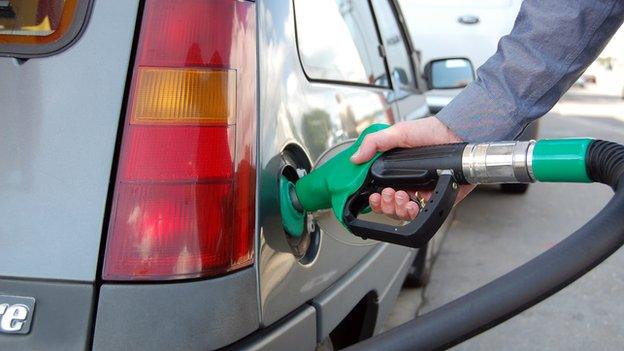A lucky chancellor
- Published
- comments
Maybe George Osborne will be seen as a lucky chancellor, because the fall in oil prices and the rate of inflation has happened at the most perfect time for the Tories - and presumably the Liberal Democrats too - in relation to the electoral cycle.
But there is a caveat, to which I will return.
Here is his bliss. The spending power of businesses and households has been significantly increased by tumbling oil prices.
In fact the Bank of England's minutes released today suggest that the halving in the oil price could add a full percentage point to global GDP or income growth within a year.
Here is one way of seeing the windfall to consumers. Private sector pay rose 2.1% in the three months to November. Inflation was just 0.5% in December.
But what makes all this even better for our spending power is that the descent of inflation towards zero has - almost certainly - delayed the day when the Bank of England raises its interest rate.
In fact market interest rates, including mortgage rates, have already fallen, in the expectation that the rate at which the Bank of England lends to banks will not increase until the end of this year or even next year.
There is no chance of an interest rate rise wiping the smile or smirk off George Osborne's face before May's general election.

Government ministers cannot rationally claim credit for the oil-linked windfall
That has been guaranteed by the decision a few days ago of the two hawks on the Bank of England's Monetary Policy Committee to stop pressing for an immediate interest rate hike and to join the rest of the committee in voting to maintain the policy rate at 0.5%.
So Mr and Mrs Feelgood-Factor may - perhaps to everyone's surprise - be casting their votes in May.
Which is not to say that ministers can rationally claim credit for the oil-linked windfall. But they'll try - and if voters have a bulge in their wallets, they may feel better disposed towards the government.
Miserly pay rises?
Ah, but what about that caveat?
Well the Bank of England points out that 40% of pay settlements will be agreed in April, around the time when the Bank expects inflation to be a big fat nought, nothing, zilcherama.
And the Bank says there is a better than evens chance that inflation will turn negative after that.
So there is a danger, the Bank says, that companies could use the absence of inflation to award miserly pay rises.
And that could do two things: it could turn our current benign low inflation into demand-crushing deflation, where falling prices precipitate lower spending and growth; and it could keep Mr and Mrs Feelgood locked indoors, a long way from the polling booths.
In fact the reason the two Bank of England hawks have abandoned their demand for higher interest rates is that they don't want to encourage employers to go for deflationary pay settlements.
But the balance of probabilities is that millions of British people will feel a bit more prosperous in the spring.
That said, the bill after the election may turn out to be steeper than we hitherto thought.
Because, with the unemployment rate now 5.8% and still falling, albeit at a reduced rate, spare capacity in the economy is disappearing.
So, as the Bank warns, after oil and energy prices have stabilised, domestic prices and inflation could bounce pretty fast.
The return to a world where inflation is a greater danger than deflation could be nearer than we think.